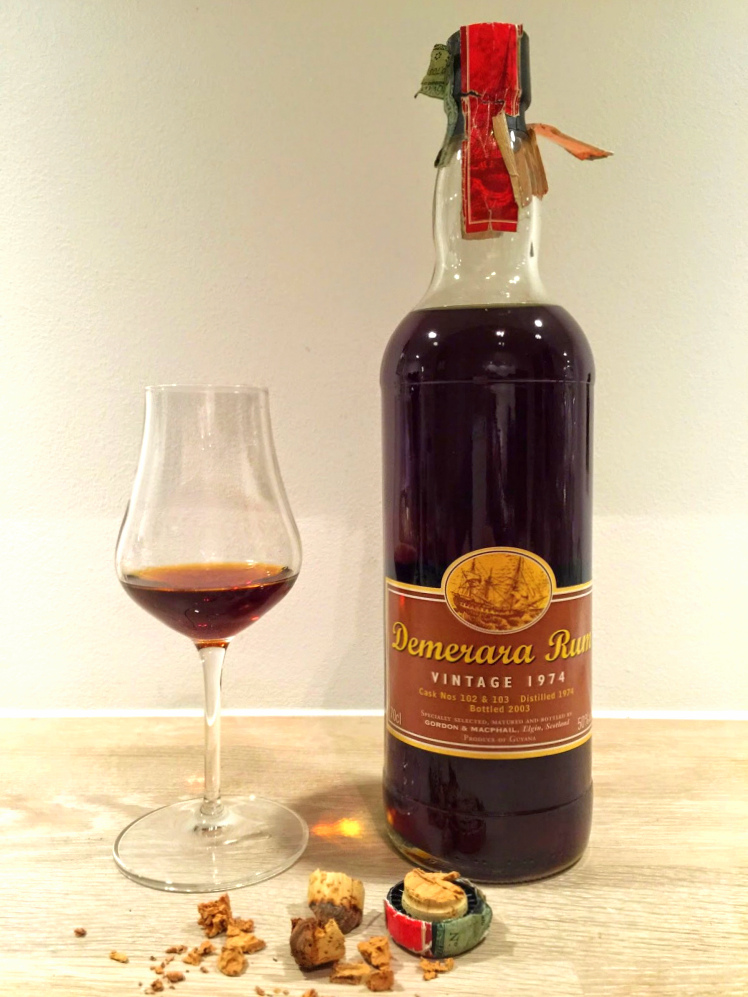
Photo (c) Henrik Kristoffersen, RunCorner.dk
1974 was clearly a good year for barrel selection by the Scottish whisky maker Gordon & MacPhail. So good in fact that they were able to release several exceptional rums from that year – one was in 1999, the near spectacular 25 year old, which my Danish friends kicked themselves for missing when it came up for a tasting one year in Berlin. They got their own back at me by locating this slightly older version that was laid to sleep in the same year, emerged 29 years later (in 2003), and which is also a quietly amazing aged Demerara rum — every bit as good as its predecessor.
It’s too bad we don’t know enough about it. Oh, there’s all the usual labelling information that would have been satisfactory a short time back: 50% ABV, distilled in 1974, bottled in 2003 from two casks (#102 and #103), and that’s certainly better than what I grew up having to be satisfied with back in the day. But we’re greedy wretches, us rum writers, and now I want to know where it slumbered and which still it came from, what the total bottle-outturn was, and how much time it spent ageing where. That I don’t have such info is something of a minor irritant, but we forge ahead with what we have.
Where the still is concerned, we can certainly guess from the profile. I mean, just nose the thing – heaven. Deep, fruity, wooden-still action all the way. Anise, blackberries, oak, ripe tart apples and overripe cherries, apricots and prunes. This is followed by molasses, dust, hay, well-polished leather upholstery, aromatic tobacco…and coffee grounds, lots of ‘em. An excellent nose, very rich, very pungent, very dark.
It tastes as good as the nose leads one to expect, and may even exceed the nose. The rum is a very dark brown, bottled at 50% ABV, just about the perfect strength for something so old and thick: enough to bring the flavours out with authority and some kick, not so strong as to burn you in the process. Here, the dark fruit panoply continues: blackcurrants, cherries, overripe mangoes. That’s joined by coffee, unsweetened chocolate, licorice, molasses, nougat, nuts and caramel. And then there’s a subtle third layer, very delicate, hinting of cinnamon, nutmeg, fennel and a freshly baked load of rye bread. The balance of the thing among these three components is really quite something, and if I had a whinge, it’s that the dry and warm finish, flavourful as it is – tobacco, leather, caramel, coffee, anise and breakfast spices – feels somewhat…less. It sums up everything that came before quite well, but brings nothing new to the party for a rousing encore, and is a. A minor point, really.
My first guess would be that the rum is from the double wooden PM pot still, because it lacks the rough wildness of the Versailles, or the slightly more elegant nature of the Enmore (which also tends to have a bit more lumber — at least a few pencils — in the jock, so to speak). But really, at this age, at this remove, does it really matter except for us who want every single detail? I call it a Demerara, as G&M do, and am happy to have been given the opportunity to try it.
Henrik Kristofferson, who runs that somnolent and suspirant site Rum Corner (and the source of the sample) remarked in his own review that with rums this old, from that far back and for this rarity, price-to-value calculations are meaningless, and he’s right. This is a rum that’s available now probably only through sample networks, which makes it unlikely that anyone will ever get a complete bottle (let alone a complete set of all the 1974s G&M have released) unless it pops up for auction again. But I must admit, it’s good. In fact, it’s as good as the other one I tried, nearly on par with some of the Velier Demeraras from the Age, or Cadenhead’s 33 YO or Norse Cask’s amazing 32 YO (both from 1975). I wouldn’t go so far as to tell anyone who sees a bottle for many hundreds of pounds, Euros, dollars or whatever, to go drain the back account immediately and buy the thing…but if you can get a taste, get it. Get it now, and get fast, because rums like this are a dying, vanishing breed, and it’s an experience worth savouring, to see how the rums of today compare against hoary geriatric whitebeards of yesteryear, like this one. We may not see their like again any time soon.
(#719)(89/100)
Other notes
There was a third G&M 1974 bottled released in 2004 that went for auction at around £600 in 2017 (which gives you some idea how these three-decade-old vintages are appreciating), and yet another one released in 2005.